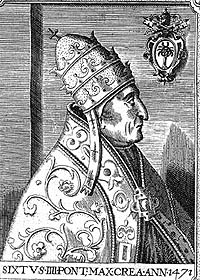 Francesco
Della Rovere was born at Celle on July 21, 1414, of poor
parents. He was a sickly youngster, and his mother consecrated
him by vow to St. Francis. At the age of nine he was put under
the care of a Franciscan schoolmaster, and later on he entered
the Franciscan order. He proved to be a talented student at the
universities of Pavia and Bologna. Ordained, he taught theology
with an extraordinary success. Even the learned Cardinal
Bessarion sat in on his lectures.
Francesco
Della Rovere was born at Celle on July 21, 1414, of poor
parents. He was a sickly youngster, and his mother consecrated
him by vow to St. Francis. At the age of nine he was put under
the care of a Franciscan schoolmaster, and later on he entered
the Franciscan order. He proved to be a talented student at the
universities of Pavia and Bologna. Ordained, he taught theology
with an extraordinary success. Even the learned Cardinal
Bessarion sat in on his lectures.
As provincial of the Ligurian province of his order,
Francesco worked hard for reform, and after 1464 when he was
elected minister-general of the order, he extended his efforts
to the whole order. He so ably defended his friars before Paul
II that not only was the Pope appeased but he made Francesco a
cardinal in 1467. Cardinal Francesco continued to live as simply
as Fra Francesco. He devoted his leisure to study and produced a
number of volumes which earned him considerable notice,
especially a work defending Mary's Immaculate Conception. With
perhaps less success he strove to show that Aquinas and Duns
Scotus differed only in words!
Such was the man the cardinals chose to succeed Paul II on
August 7, 1471-- a friar, zealous for reform, a hard-working
scholar learned in theology. Surely now it would seem that the
church had a leader who would undertake the root-and-branch
reform so long desired. But not since Urban VI had a pope been
more of a disappointment.
It is true that Sixtus IV, as Francesco chose to be called,
accomplished some good in his pontificate. He tried to regulate
abuses in the inquisition. He made Rome more sanitary. He could
be called a second founder of the Vatican Library. He was a
great patron of art, and for this he will be remembered whenever
men look at the Sistine Chapel.
In spite of all this his pontificate must be considered a
dismal failure. At a time when the Church needed reform and
rightly expected vigorous leadership in that direction, Sixtus
IV caused the moral tone of Roman ecclesiastical life to dive
sharply. Not that he was crudely immoral: the Franciscan pope,
devoted to Mary, lived a private life which is attacked only by
gossipy enemies whose testimony is of no value. The crime of
Sixtus was nepotism. From Liguria came numerous relatives to
fatten on church wealth and to lower church standards. He
created youthful nephews cardinals and loaded them with
ecclesiastical plums.
The moral tone of Rome sank as parties, gambling, and loose
living became commonplace. The older cardinals looked on with
dismay at these manifestations of a new spirit, but they were
dying off, and the future remained with the numerous cardinals
created by Sixtus IV, the cardinals who did much to pave the way
for the success of the Protestant revolt.
Sixtus lowered the prestige of the papacy also by becoming
involved in a shabby conspiracy to overthrow the Medici in
Florence. To do him justice the Pope insisted that no blood be
shed, but still any connection with the Pazzi conspiracy, which
was climaxed by a murder on the altar of the cathedral in
Florence, is a disgrace to a Pope.
Sixtus IV died August 12, 1484, in the midst of diplomatic
and military failure. It was fitting, for the keynote of his
pontificate is failure.
Excerpted from "Popes
Through the Ages" by Joseph Brusher, S.J.

